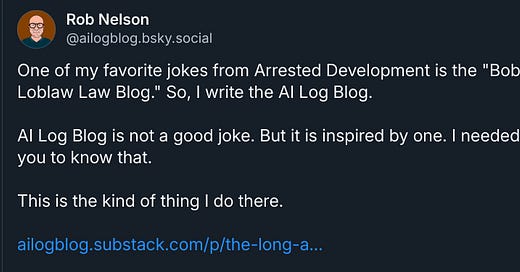Long posts, rarely
If “Brevity is the soul of wit” captures the ethos of microblogging, then “Screw Gmail’s size limits. I have something important to say” seems like what some folks around here are up to. Maybe it’s just me who likes that Substack invites writing and reading more words, not fewer.
I think of myself as a macroblogger who posts when I have something worth sharing. This despite the truth of
’s observation that “the cornerstone of internet success is not intelligence or novelty or outrageousness or even speed, but regularity.” And, he might add, brevity…TLDR and all that.Long posts, rarely, is what you get with 𝐀𝐈 𝐋𝐨𝐠. Take that, internet success!
Earlier this week, I betrayed my commitments to long-form writing and signed up for Bluesky. I lurked on Twitter for about a week in 2016 before deciding it was not for me, so I get a bit lost sometimes. Like being in a dream where you’re at a party, and you understand the words people say, but the actual conversations are impenetrable. I expect to look down at some point and realize I’m in my underwear.
This hasn’t stopped me from trying.
Mostly, though, it is too much fun. Four days in, and I have set a daily limit. No more than an hour and only after my writing brain is done for the day. It would be great if Bluesky joins Wikipedia, the Internet Archive, and Quote Investigator on my list of reasons to be thankful for DARPA. Not going to count on it, though.
As with Substack, I will make sure I know where the exits are located. If it turns to shit, I can’t say Corey Doctorow didn’t warn me it could happen.
The important work
is one of the people who has been helping me understand what needs to change about how I teach writing in the age of AI. Her , along with many other Substacks including , Rhetorica by , and John Warner, doing double duty with The Biblioracle Recommends and , have been a lifeline for those of us drowning in an AI information ocean where what looks like water safety flotation devices are often bottles of AI Snake Oil. Rosenzweig’s announcement of The Important Work looks to me like an interesting experiment. On its good days, Substack seems like it could help create twenty-first-century versions of chapbooks, little magazines, and zines. If that’s true, we need to start trying it out. So much of digital social media is organized around the creative work of individuals, and yet we all want collective action.
If you are looking for a collective start on Bluesky, here are two starter packs by Substack writers I value.
AI and writing, AI in education, AI regulation by
. of .You’ll find janerosenzweig.bsky.social there as well.
Check out The Important Work, and let me know about other collective efforts on Substack, Bluesky, or elsewhere in the comments.
Promoting collective efforts
Speaking of collective efforts, I am moderating a LinkedIn Live event for
and , two writers who are a big part of the group doing the important work of writing about teaching writing after ChatGPT. The event promotes their co-authored book, AI in Education: A Roadmap for Teacher-Led Transformation.As the title suggests, these two take the practice of teaching seriously. They offer educators something many technology companies and AI enthusiasts can’t seem to pull off: an approach that considers the needs of actual teachers and students.
The event starts at 1pm ET on Wednesday, November 20th.
Register here: https://lnkd.in/eQMe6suV
Mike “Stranger Danger” Kentz
vs.
Rob “LLMs Aren’t People” Nelson
Another cornerstone of internet success is generating outrage, but Mike Kentz is too nice a guy for me to even fake it WWE-style. For the past few months, he and I have been debating the topic of anthropomorphizing AI models in the context of teaching. You can read my take in Let’s Stop Treating LLMs like People and his in Stranger Danger: Effective AI Use via Critical Thinking and Humanities Skills.
Mike has a gift for translating complex pedagogical ideas into practices that make sense to teachers, most famously in his “grade the chats” approach to incorporating AI feedback into his classroom.
We agreed to write a series of posts exploring our different perspectives. This is my reply to his kick-off essay, a neat little piece of cultural criticism about the way Peter Brown’s The Wild Robot echoes Kipling’s The Jungle Book.
Here are Part One and Part Two of Mike’s The Wild Robot, Pop Culture, and AI.
Here is my reply: Murderbot, AI, and Techno-Capitalist Futures.
Not sure how long the series will be or where it will take us, but this is a fun start.
𝑨𝑰 𝑳𝒐𝒈 © 2024 by Rob Nelson is licensed under CC BY-SA 4.0.





Great issue, appreciate the links to the Bluesky starter packs. I recently joined Bluesky @margiewhiteleather.bsky.social because I heard that much of the higher ed community I'd followed on Twitter until 2 years ago was on Bluesky. My microblogging muscles are rusty, but so far it's great. My only fear is that it will make it harder to keep up with newsletters, which is where I'd shifted my online reading time.
The lighthearted but meaningful discourse is fantastic. It’s the nuance that Substack facilitates compared to the all-or-nothing on other platforms, and this post captures the goodness of the forum and the goodness of complex conversations.